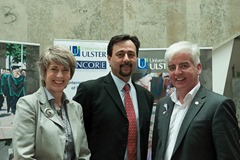Sharing social policy skills
 An overview of how the MSc in Social Research Skills with Specialisms can improve your research performance.
An overview of how the MSc in Social Research Skills with Specialisms can improve your research performance.
Today, how many of us, working across the public, private and voluntary sectors, find that we need to improve our social policy analysis and research skills?
We may need these skills to either review and analyse existing research to inform our work or we may need them to help us design, conduct and present our own research. But we may find it difficult to access on-site programmes or not have the time to travel to and participate at designated times in such programmes.
The University of Ulster’s School of Criminology, Politics and Social Policy offers an innovative on-line MSc Social Research Skills with Specialisms and linked Postgraduate Diploma and Postgraduate Certificate courses that are designed to meet the needs of people interested in developing research and evaluation skills in subjects informed by social policy concerns.
Evidence-based policy and practice is increasingly the norm across all sectors and many professionals need to enhance their skills and knowledge in this area. They may not actually be undertaking research themselves but may have to commission it or interpret the findings. These courses are designed to address that need. Modules on quantitative and qualitative methods and research, public policy and evaluation form the core of the programme. Participants in the MSc also take a specialist module and complete an independent research project, which can relate to their work situation, in which they demonstrate the application of research and evaluation skills.
As a programme delivered by experts based in Northern Ireland it is unsurprising that one of the specialist modules offered focusses on doing research in divided societies.
Researching Peace and Conflict
This specialist module has proven attractive for many students working for organisations like the United Nations and NGOs working in peacemaking and peacebuilding around the world. In Northern Ireland this not only includes policy makers but also many grassroots organisations which increasingly are called upon to conduct their own research or to evaluate programmes they are implementing to build peace. The module is premised on the understanding that working on (and in) violently divided societies affects the way we do research, and what we research. The module seeks to increase awareness of how contexts of violent conflict affect research and vice versa. The programme has been developed by academic staff in INCORE (the University of Ulster International Conflict Research Institute) whose personal expertise in doing research in a range of violently divided societies enhances the programme.
How does the programme work?
Distance learning programmes are approved and validated in the same way as all other validated on-site postgraduate programmes. All that differs is the mode of delivery. Students access the on-line materials in their own time and engage with academic staff and their peers through on-line discussion and other online fora. For many students this provides an opportunity to develop their skills and enhance their curricula vitae that would not be possible through traditional on-site courses.
While the University of Ulster is based in Northern Ireland students on this programme have been based in Ireland, North and South, Great Britain and other parts of the EU as well as Australia, Botswana, Iraq, Liberia, Malawi, Sri Lanka and Switzerland.
For more information on the MSc Social Research Skills with Specialisms programme by distance learning visit: www.ulster.ac.uk/elearning/programmes/view/course/10249 or phone 028 7167 5434.






